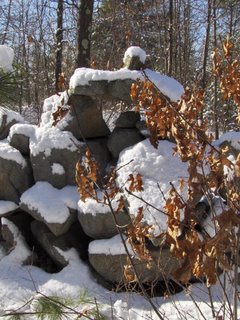 In this example, the "see-through" structure is a good three courses higher than the rest of the wall. It is hard to not see that as deliberate.
In this example, the "see-through" structure is a good three courses higher than the rest of the wall. It is hard to not see that as deliberate.Monday, February 05, 2007
"See-through" stone wall at the high point
It seems to be a classic pattern that a stone walls becomes suddenly higher as it passes over the high point of a knoll (see here). While passing over this high point, the wall also becomes lacey: with one or several holes that you can see through. It is possible this is part of a ceremonial architecture, but it will take a lot more examples before I am convinced. Meanwhile, lets keep our eyes out for examples of this phenomenon. Here are a couple of example from Groton on the way to Horse Hill. (Even a small bit of snow makes it hard to find rock piles. But obviously it would take a lot of snow to hide these walls. That is what I could look at this weekend.)  In this example, the "see-through" structure is a good three courses higher than the rest of the wall. It is hard to not see that as deliberate.
In this example, the "see-through" structure is a good three courses higher than the rest of the wall. It is hard to not see that as deliberate.
 In this example, the "see-through" structure is a good three courses higher than the rest of the wall. It is hard to not see that as deliberate.
In this example, the "see-through" structure is a good three courses higher than the rest of the wall. It is hard to not see that as deliberate.
I just stumbled on this post while looking for something else. This reminds me of the wall here The wall I found doesn't come up over a rise, but it is at the top of a hill and is 'lacy' where it rises. Although, I need to go back out now that the snow is gone, to see if parts of the wall are collapsed, as you mention. I just wanted to put in a note about it to try to keep these connections together.
ReplyDelete